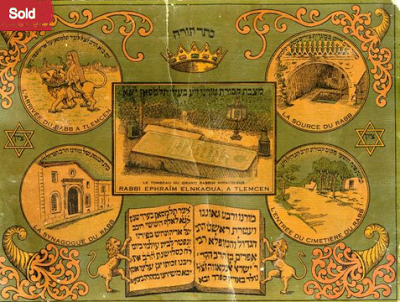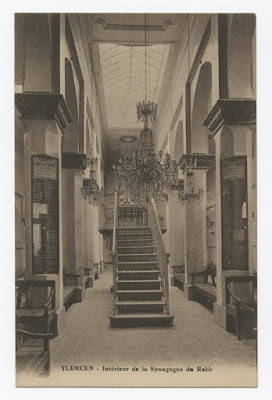
The tomb of the 15th century rabbi Ephraim Alnaqa (also known as Encawa) remains off-limits to Jewish visitors to Algeria, the largest group of tourists to the country. The last hilloula, or pilgrimage, was in 2005. (If the Algerians were to emulate the Moroccan and Tunisian government, they could be reaping the dividends from Jewish tourism.) Jewish visitors still come to visit their properties, however. Illuminating article by Reem Hayat Chayef in Raseef22 (with thanks: Boruch):
This lithograph depicting the tombs of the rabbis of Algeria shows rabbi Alnaqa riding a lion with a snake in its mouth (for the origin of the legend see here). The item was sold for $144 at auction (with thanks: Boruch)
The site of Alnaqua’s burial in Tlemcen made it to be revered as a holy land over generations of Jews, whereby the mausoleum marked a point of pilgrimage in May of every year. After the Algerian independence from French colonialism, the pilgrims were banned from entering.
Reviving the Pilgrimage
After the independence of Algeria, Jews were forbidden from pilgrimage to most of the holy sites in North Africa. In 2003, under the rule of current President Abdelaziz Bouteflika, a plan was set, in collaboration between France and Algeria, to reopen the Jewish synagogues and burial sites in Algeria.
In 2006, the Algerian parliament passed a law guaranteeing freedom of religion, which led to the authorization of an official Jewish association in Algeria.
Moreover, in 2005, in response to a request from France, the Algerian authorities permitted the relaunching of the pilgrimage season for Jewish delegations from Europe. Jewish delegations began pouring in to visit the various historical and religious sites, and to perform the pilgrimage to the mausoleum of Ephraim Alnaqua.
Inside the Rabb synagogue in Tlemcen
Those would mark the last of the publicized pilgrimages, as Algeria once again suspended them during the Israeli war on Gaza in 2006. In the meantime, the locals in Tlemcen had not taken well to the initial decision to allow Jewish visitors in. Instead, they organized large marches in protest, and threatened to burn the remaining Jewish properties in the city.
Prior to the resumption of the ban, the Jewish pilgrims and visitors recorded the largest touristic group to visit independent Algeria. The visit lasted for eight days, during which they celebrated their rituals in front of Rabbi Ephraim Alnaqua’s mausoleum, including performing the ritual circumambulations around it and spraying it with water and salt.
Belbachir Jalloul, a former professor at the Faculty of the Arts, tells Raseef22: “I was there for the Hilloula rites held by the Jewish delegation in Tlemcen. They walked from the graves to the end of the synagogue, chanting words from the holy book.”
Visitations Continue
“Every year, a number of Jews travel to Algeria to visit their properties here. I worked as a tour guide with a convoy of Jewish tourists in 2011, and they visited a number of places marked with the Star of David here in Tlemcen,” Shawi Boudaghn says.
“However, they weren’t able to visit the mausoleum of Ephraim Alnaqua, since their visit coincided with the declaration of Tlemcen as a capital of Islamic culture, and the wali was not there to grant them an entry permit.”
She adds, “during the visit, I could hear many of them exclaiming that this was someone’s home once, or that was someone’s father’s shop.”
In 2014, Minister of Religious Affairs Mohamed Eissa declared his intent to reopen the closed Jewish synagogues. Against the outcry by Salafis, who considered this an act of provocation, he affirmed that the Algerian constitution guarantees the freedom of belief, and that the authorities would provide security protection to these areas. He later backtracked, stating that there was no clear timeline for reopening the synagogues, and claiming that the Jewish representatives themselves were not enthusiastic about the reopening, as they feared potential tensions.


Leave a Reply